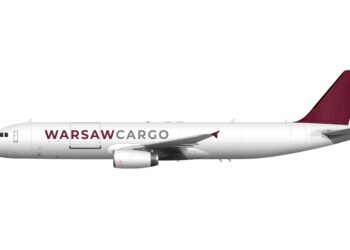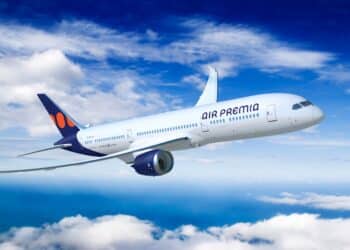5 takeaways from Air Cargo China

Shanghai –Last week, Cargo Facts was once again in Shanghai, this time around exploring the massive exhibition halls of the air cargo pavilion at Transport Logistic China. A May-heatwave might have driven foot traffic to stands with cold beverages, or prime locations underneath air conditioning vents, but there was no shortage of revealing interviews and insights to come out of the event. On Thursday, we broke news of Qatar Airways’ desire to shrink its A330-200F fleet. Today, we continue with five takeaways from Air Cargo China. Join us tomorrow for a look at the future of Cargolux’s fleet.
1) Carriers so far unaffected by US-China tariffs, but threat of trade war remains a cloud on the horizon. Global air cargo carriers maintained that the Trump administration’s planned tariffs of up to $150 billion on Chinese imports, and the retaliatory tariffs on US Imports from China, have so far had little impact on air cargo volumes. Luxembourg-based Cargolux president and CEO, Richard Forson warned however, that things could quickly change. “As soon as tariffs start effecting perishables and other high-end electronics that get flown, especially during peak season, it could lead to reduced volumes on the major trade lanes between those two countries.”
Rumors of US imports being held-up in Chinese customs were already quite common. In late April, Chinese customs resumed the previously idled process of inspecting all fruit shipments originating in the United States. In November 2017, China had relaxed inspection requirements for inbound fruit, testing only about one-in-three shipments. So far, there is no evidence of a jump in the number of failed inspections, although Reuters confirmed that some citrus and apples have been rejected.
US West Coast cherry growers are monitoring the situation just as closely as the air freight industry. Last year, the United States exported some $119 million worth of cherries to China, most of which moved into the country by air. The first of this year’s crop have already departed California, and exports from Washington are expected to commence in early June.
This year, cherry exports could very well continue uninterrupted. As of 20 May, the US has put its plan to slap China with additional tariffs on hold. Beijing and Washington continued to negotiate over the weekend, appear to have idled plans to escalate the trade war.
2) Subsidies to continue promoting “interesting” freighter destinations throughout China. The desire of local governments to support air freight logistics within their domicile appears to be stronger than ever. Subsidies and other forms of support are likely to continue encouraging carriers to launch scheduled and express freighter flights to and from origins and destinations that otherwise would be hard to justify on a purely commercial basis. The latest rumor is that a carrier will soon launch China-to-Europe flights with a nearly empty 757F.
In related news, forwarders continue to explore dedicated freighter and charter options as tight capacity and elevated rates persist. Last year, APEX Globe and Flexport both launched dedicated freighter flights to accommodate demand on the China-US trade lane. Beijing-based freight forwarder Sinoair (a subsidiary of Sinotrans) is another forwarder that has long chartered capacity between China and North America. Looking ahead to this year’s peak season, Sinoair said it was considering additional charter flights.
3) China Customs Advanced Manifest (CCAM) regulations go into effect on 1 June. In an effort to expedite customs clearance for inbound and outbound goods, General Administration of Customs China (GACC) will require that advanced manifest data be submitted to customs prior to cargo being loaded onto an aircraft. Carriers are hopeful this will make it easier for goods to clear customs while in-transit and believe that this could make it easier to boost operations at secondary airports throughout the country, where customs infrastructure is less-developed. Details surrounding the new regulations, or their implementation are still however, quite sparse.
4) PACTL pushes digitization with first paperless pilot. Although e-AWBs are not new to Shanghai’s PVG airport, customs has always required physical print-outs alongside the electronic documents. This is no longer the case. Christian Haug, VP PACTL told Cargo Facts that after a series of productive conversations with various customs authorities in Beijing, all parties involved are now receptive to electronic documents. On 15 May, three of PACTL’s airline customers, Lufthansa Cargo, Air China Cargo and Cathay Pacific Cargo, began participating in a new pilot that utilizes e-AWBs as they are intended to be – without paper. If the tests work, Haug says he sees no reason why other stakeholders at the airport couldn’t quickly make the switch to digital.
5) Boeing not taking any new orders for the 747-8F. Although Boeing has in public said that it remains committed to the 747-8F program, multiple carriers have said the manufacturer is not currently taking orders for the aircraft. Cargolux’s Forson confirmed to Cargo Facts during a lengthy and insightful interview, that even if his airline wanted additional -8Fs, Boeing would not sell them to him today. “They are delivering a total of 28 to UPS, and another five are going to other carriers. Beyond that, they have not made any definitive announcement as to whether the program will continue or not.” Just what might this mean for the future of Cargolux and its freighter fleet? Join us tomorrow to find out.




